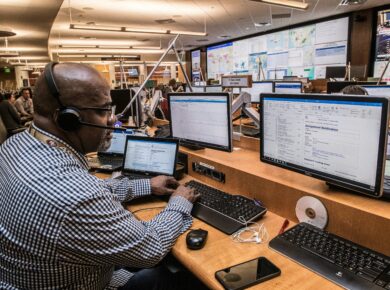The role of Nigerian languages in the media is that they reinforce the idea that information flow in the indigenous languages is a requirement for mass involvement.
Information departments in every state and specialist groups such as MAMSER, Public Enlightenment Committees, National Orientation Agency, and Ministry of Information and Communication, prepare and disseminate information from the government to the people.
It is important that individuals and groups need to know what the government is doing or plans to do. People know what the governor is doing, what they want them to do or not to do, and what they need, feel, or dislike.
How can government information and rural development training be disseminated in rural areas other than through local languages? This ensures mass participation and grassroots involvement to ensure widespread and genuine development.
The role of Nigerian languages is numerous. Language is like a currency; the more it can buy, the greater value it has.
Agricultural role
Information on fertilisers, pesticides, high-yield varieties of crops, appropriate planting seasons, irrigation and preservation, as well as marketing outlets, is better given to farmers in the languages they are familiar with.
Moreover, Nigerian languages are used to disseminate information on planting and harvesting seasons. Talk on how to check erosion, preparation of farmland with modern techniques, and helpful insects to farmers are more useful to farmers if given in the language they understand.
In addition, animal husbandry and the economic tree can thrive more if the farmers are well-grounded in this occupation. The outcome will be enough food for the nation and more money for the farmers.
Health role
Health is wealth. Health campaigns in Nigerian languages in the form of posters, handbills, radio talks, and film clips by health workers will help eradicate sickness and diseases.
Information on environmental sanitation, nutrition, preventive measures, first aid, immunisation, family planning, ante-natal, and child care in Nigerian languages helps the nation to be healthy.
Information on personal cleanliness, venereal diseases, the effect of prostitution and malnutrition, etc., helps the masses to live long and be productive.
Political role
Nigerian languages play a powerful role in political mobilisation. The rural masses need information on government activities, the constitution, elections, and political parties.
The only way they can effectively participate without selling their votes and being involved in anti-election activities such as thuggery, arson, rigging, etc., is by getting information in the language they understand.
The government, through its agents, disseminates information about its activities and gets feedback from the masses. Political awareness is important in this era of election mobilisation.
Economic role
Literacy in Nigerian languages helps for economic buoyancy for the populace in the area of better food, clothing, better farm yield and good accommodation. This helps them to learn about the importance of banks and how to manage their money.
Alternative ways of making a living and raising a family’s economic production can be obtained through lectures or talks in Nigerian languages. When there is enough money to solve one’s problem, most of the societal ills/vices will be a thing of the past.
Education role
Literacy in the Nigerian context must mean paying more attention to indigenous languages as an effective means of eradicating illiteracy. This functional literacy is effective if people’s languages are used to bridge the communication gap.
Using the media such as radio, television, and printed materials to educate, inform, entertain and disseminate information is better in the languages the wider population understands. Adult literacy has been a major domain of the National Policy on Education.
This is principal because of the large numbers of the illiterate population and the virtual impossibility of providing literacy teaching in anything but the adult’s first language.
Socio-cultural role
Communication in Nigerian languages helps to attain status based on merit and motivates the illiterate to become literate. Parents are also aware of the value of educating their children.
It helps with interpersonal relationships, self-reliance, independence, creativity, and ingenuity. It helps to foster greater tolerance and respect for other people’s religions, beliefs, and cultural differences.
Musical role
Music in Nigerian languages acts as a social crusader, advocate of justice, and critic of the government and is used to propagate good societal virtues. Government policies and intentions are better propagated in song renditions.
Some of these songs know no linguistic barriers as they are enjoyed by all. Some notable musicians are Sunny Ade, Sunny Okosun, Lagbaja, Onyeka Onwenu, Late Fela Anikulapo Kuti, Sunny Ade, Zaki-Adzee, etc.
Religious role
The doctrines of these religious groups, i.e. Christianity and traditional religion, spread in Nigerian languages. The Muslims speak their message in Arabic and in some cases in the Nigerian languages.
Their sermons, prayers, songs, crusades, and all their activities help with good moral conduct, courage, peaceful co-existence, justice, love, and kindness that the nation needs.
The tenets of these religions, if well propagated, will put an end to tribal and religious ways that are prevalent in the country.
Scientific and technological role
Ezikeojaku (1997) insists that ‘the use of indigenous Nigerian languages will enable Nigerian scientists to research into our local products which will then become the basis of our industrial growth.
Foreign ideas, concepts, and technologies will undoubtedly be imported into a foreign language, but such concepts must be transmitted to the masses in a language that they can understand.
If the scientific and technological terms, processes, and concepts are translated into Nigerian languages, the miracle Japan attained by indigenizing and translating the processes into terms in their languages will be achieved in Nigeria.
Telecommunication role
These are fax, telex, packet switching, teleconferencing, computer conferencing, radio, e-mail, cellular, mobile telephone, communication satellites, television, etc.
These communication tools are used at home, school, business, industry, in the state, government, ain nd would affairs depending on the one most suitable for the occasion. For communication to be effective for the vast majority of Nigerians, the medium should be the Nigerian language.
A nation that lacks this ingredient for self-realisation through its languages can only be a breed of sycophants rather than citizens.
The national curriculum conference, which led to the formation of the National Policy on Education, revised in 19,81, stipulates the study of Nigerian languages. The summary is that a child should be taught in his MT in the first three years at the primary level.
Conclusion
For an individual to realise his whole potential, become informed, enlightened, learned, and properly educated, he should be given this information through the language with which he is more familiar with hence his mother tongue.
No communication means no survival. The communication process means information flows from a source or a sender through a channel to the receiver or destination. Language is central to the teaching-learning process. The Nigerian language is important to the protection, preservation, and promotion of Nigerian cultures and the enhancement of human dignity.
Barriers to Nigerian Languages
The necessity of learning a major language to promote national unity and integration has constitutional backing. The importance of the mother tongue in education is emphasised by Orimoloye (1977) when he states that the ‘mother tongue in a child is psychologically a system of meaningful signs that in his mind works automatically for expression and understanding.
The use of Nigerian languages for effective communication is beset with problems. The problem has affected every facet of speaking, writing, and thinking of Nigerians. The problems can be traced to governments in all areas, historical constraints, pedagogical constraints, socio-linguistic constraints, and economic constraints.
Government
The language policy in the National Policy on Education is a statement of intent rather than a serious program for implementation. There is no definite chronogram for all states to follow.
There are no legal or other sanctions for defaulting on federal, state, and local governments that control the schools. The government has not provided the materials, funds, and teachers for effective implementation.
Historical constraint
The inheritance situation whereby the colonial language, English, is the language of wider communication affects the development of Nigerian languages.
The dominance of English in news broadcasts, special features, talks, documentaries, politics, public service broadcasts, and government activities hinders the development of the Nigerian languages.
Opubor (1973) corroborates, saying, ‘Media content in Nigeria is oriented towards the elites that on radio and TV, news bulletins in English are three times as long as the equivalent in any other languages and that media coverage in minority languages is virtually non-existent.
Most languages don’t have newspaper patronage. How can the masses read and acquire information for their development if the information is given in a foreign language?
Pedagogical constraint
The conditions and facilities for teaching these languages are inadequate. The 3 years of JSS L2 (second language) are not enough for cultural immersion and the political unity envisaged. How can we develop and accommodate other languages for effective communication?
There are inadequately trained teacher; in most cases, they are underutilised and told to teach their second subject. Some states retrench some teachers, including Nigerian language teachers.
In most cases, the states don’t employ them at all. How can the policy be implemented in this situation where the government pays lip service to the policy and there is no progress beyond the pronouncement?
Socio-linguistic constraint
The status of the language, the size of the speaker, the state of the language development, and adequate terminology for teaching affect some of these languages that are a minority in the region where they are spoken.
In this case, it will not be used for the effective communication of government programs. This affects the survival of the language which the child needs for initial literacy.
Economic constraint
There are too many languages in the country, and most of them lack written literature. Language is a currency; the more it can buy, the greater value it has.
It will take excessive funds to provide education in all the languages when the government cannot even pay teachers, provide employment, and essential services to the 120 million Nigerians. The adult literacy program is not well-organised.
In most cases, the instructors, inspectors, and teachers are not available. When available, the materials, funds, and infrastructures are inadequate. The media, electricity, newspapers, and all the communication media are nonexistent in most rural areas.
How then can they be involved and participate fully in the country when information is not disseminated to them in the languages they understand?
Recommendations/Suggestions
Attention should be given to professional linguists and media educators, a nd get them involved to get the best for the adults through airing more programs in the Nigerian languages.
Curriculum
The curriculum should incorporate the teaching of the mother tongue in the syllabus of the media education department in the tertiary institution for qualitative education and moral training.
Entertainment
Many entertaining and educational plays in Nigerian languages should feature more films, home videos, and television provided by the government in rural settings.
Materials for training
The government should produce materials for the training of teachers. The Nigerian language teachers should be given employment and incentives, and be employed on a part-time basis to give literacy talks to the rural dwellers. The government should also provide orthography, materials, and translation services for some minority languages.
Term implementation
The language policies are couched in the most general terms; implementation should be vigorously pursued in schools and even in the National Assembly, where there is provision for conducting business in the major Nigerian languages.
There should be the production of texts in most languages through the use of computers, which can provide a wide variety of characters. There should be terminology for official use in different fields of endeavour in Nigerian languages. These will be made available to rural dwellers.
Qualitative and Quantitative Increase
There should be a quantitative and qualitative increase in the intake of L1 and L2 students in Nigerian languages. They should be aware of the role of Nigerian languages, initial literacy, mass literacy, mobilisation, and adult literacy.
Language Inspectors
Priority attention should be given to the recruitment of language inspectors. There should be more courses offered in Nigerian languages in tertiary institutions.
Electronic and Print Media
There should be more airtime in electronic media for Nigerian languages. Also, there is more print space in the print media for Nigerian languages.
Local newspapers in Nigerian languages should be published at least once a week in most languages. This will help them discuss peculiar problems and be enlightened about government programs.
Finally, for an individual to realise his or her whole potential, become informed, enlightened, learned, and properly educated, he or she should be given this information through the language which he or she is more familiar with, hence his or her mother tongue. Read the similar post on this page.










